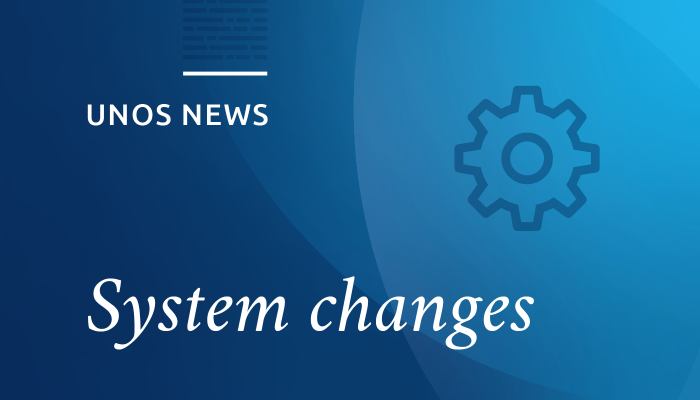Implementation date:
Dec. 1, 2020
At-a-glance
Phase I of Organ Procurement and Transplantation Network policies that address how medically urgent kidney candidates are prioritized in the new kidney allocation system are in effect. Phase I provides kidney transplant staff two weeks to update candidate data ahead of final implementation. You and your staff will need to understand which candidates qualify for this status in addition to how the medical urgency status is prioritized.
Phase II implementation will occur on Dec. 15, when donation service area and region are replaced with a 250 nautical mile circle for kidney and pancreas allocation.
Summary of changes
During Phase I, transplant program staff should pre-fill data early for any candidates who will meet the new definition of medically urgent. This will allow your candidates to receive priority at the new status as soon as the new policy is implemented.
During Phase I, candidates won’t accrue waiting time at the new medically urgent status or receive priority based on this criteria.
What you need to do
Kidney programs will need to:
- Review their current medical urgency status exceptions
- Enter additional data in Waitlist℠ for candidates who meet the new medical urgency definition to gain medically urgent status
- Document the medical urgency qualification in the candidate’s medical record and submit medical urgency supporting documentation as an attachment in the Waitlist record within seven (7) business days of indicating medical urgency status for a candidate.
How to submit supporting documentation
To satisfy the policy requirements to submit supporting documentation to the OPTN, UNet℠ users will access a new feature in Waitlist that will allow them to attach medical urgency supporting documentation to the candidate record itself. To submit this documentation, users should:
- Access the patient record in Waitlist
- Select the “Attachments” button at the top of the record
- Select the file to upload
- The file will save as a PDF
If a file is uploaded to a candidate record in error, you may contact the Organ Center for assistance with removing it from the record. Find more information, including a list of acceptable file types, in Waitlist Help Documentation.
Professional education resources
You can find all policy notices, including the one addressing medical urgency, in the policy toolkits in the Professional Education section of the OPTN website:
- Removal of DSA and Region from Kidney Allocation Toolkit
- Removal of DSA and Region from Pancreas Allocation Toolkit
- Modifications to Released Kidney and Pancreas Allocation Toolkit
- Addressing Medically Urgent Candidates in the New Kidney Allocation System Toolkit
Find on-demand professional education resources for the removal of DSA and region on UNOS Connect:
- KID113 Medically Urgent Status for Adult and Pediatric Candidates: Phase One
- KID112 Removing DSA and Region from Kidney and Pancreas Allocation
- KID114 Medically Urgent Status for Adult and Pediatric Candidates: Phase Two
- KID111 Modifications to Released Kidney and Pancreas Allocation
- QLT102D Notification Limits for Distance-based Allocation
- QLT103D Acceptance Criteria for Distance-based Allocation
Do you have questions about this policy and the implementation?
If you have questions about the implementation, please contact UNOS Customer Service at [email protected] or call 1-800-978-4334 from 8 a.m. to 7 p.m. EST.

